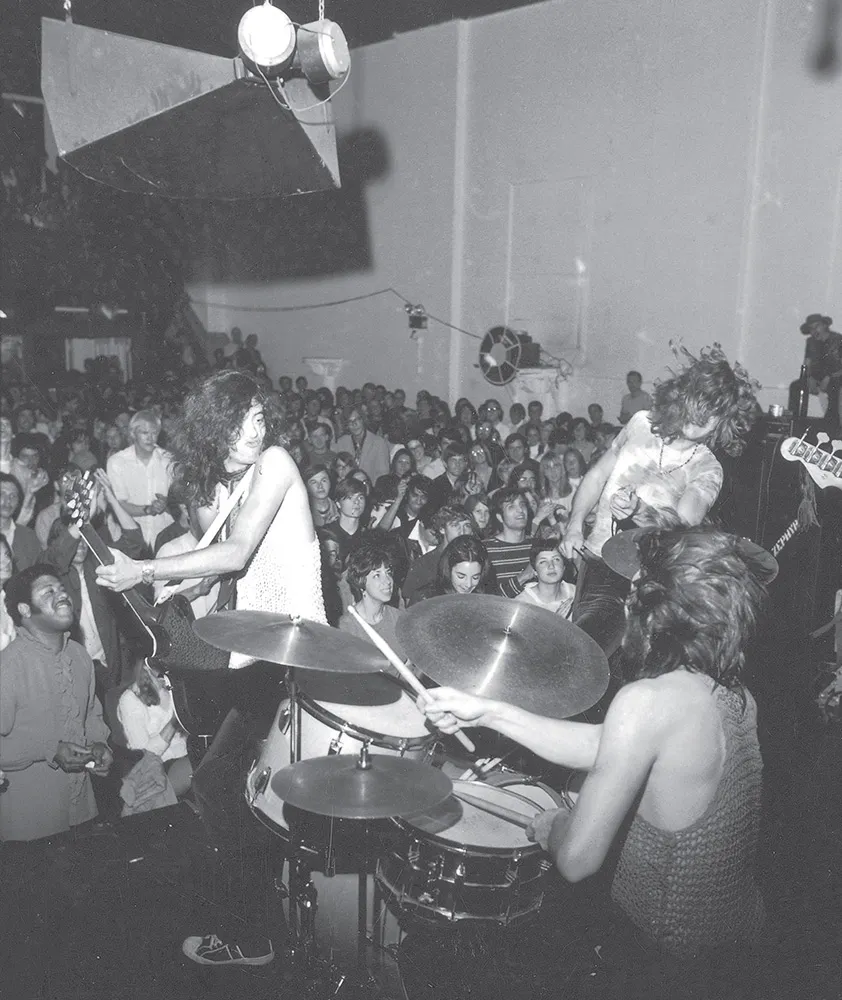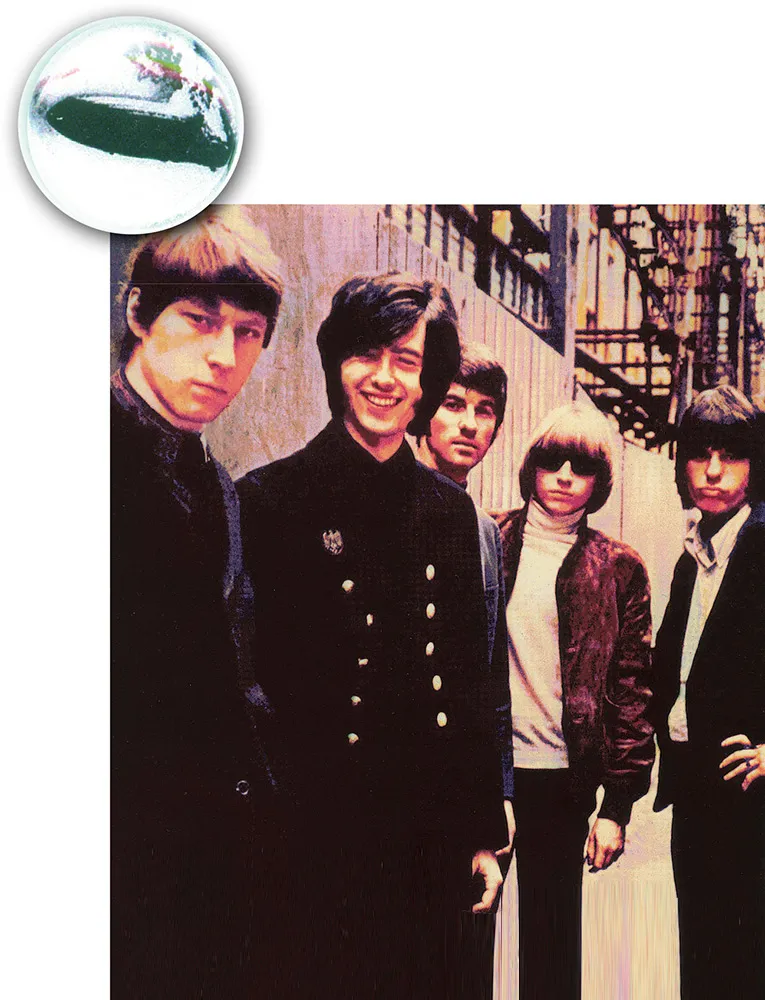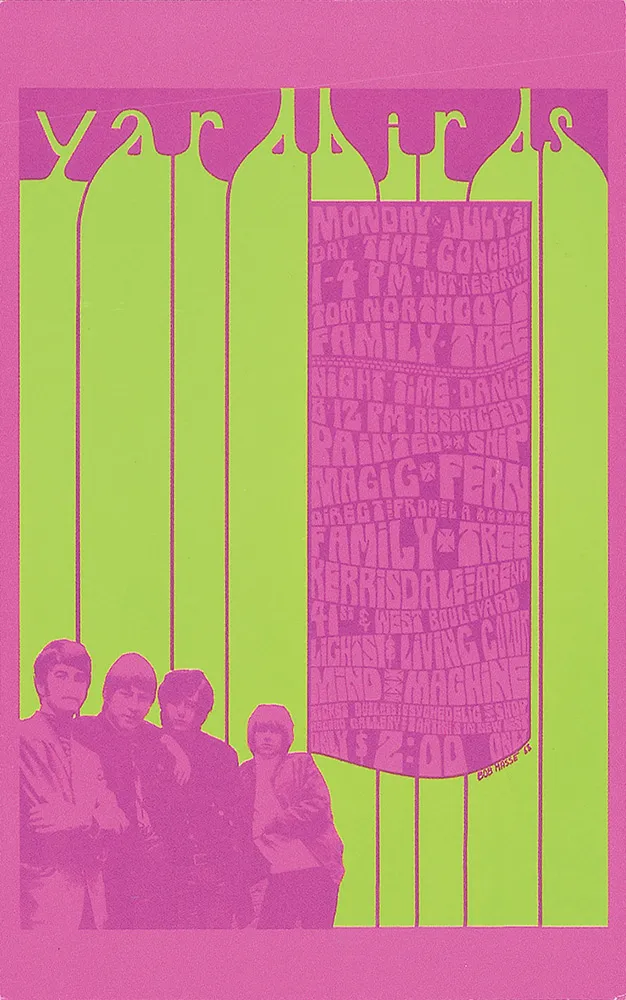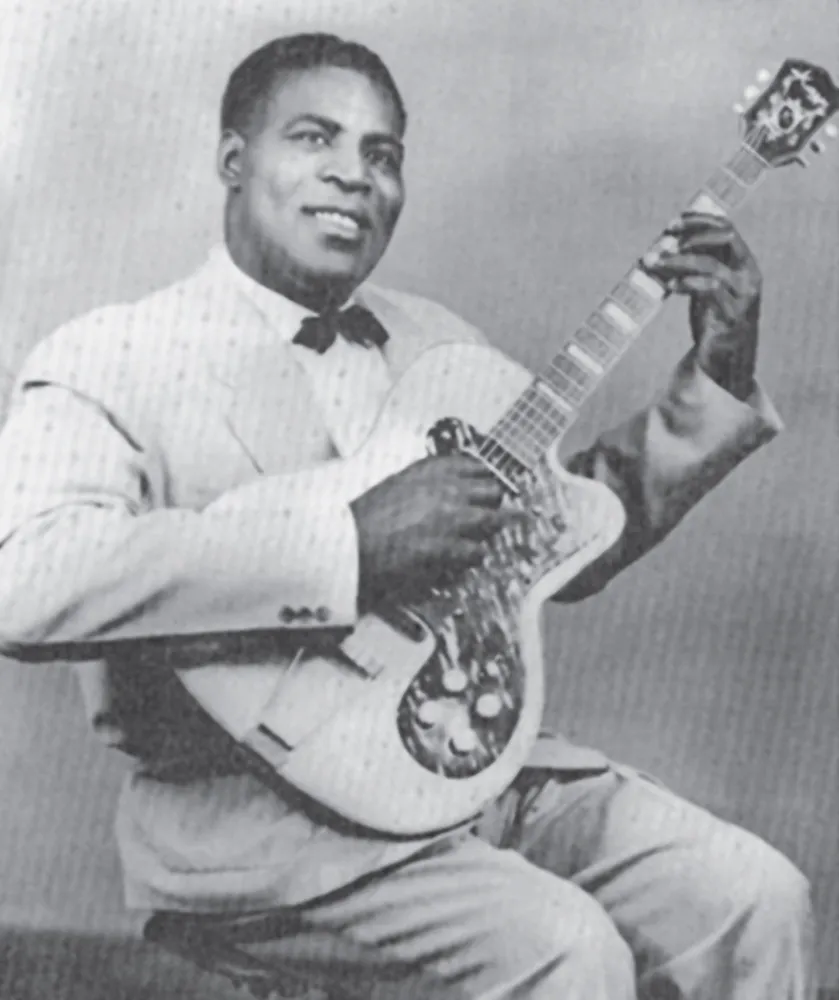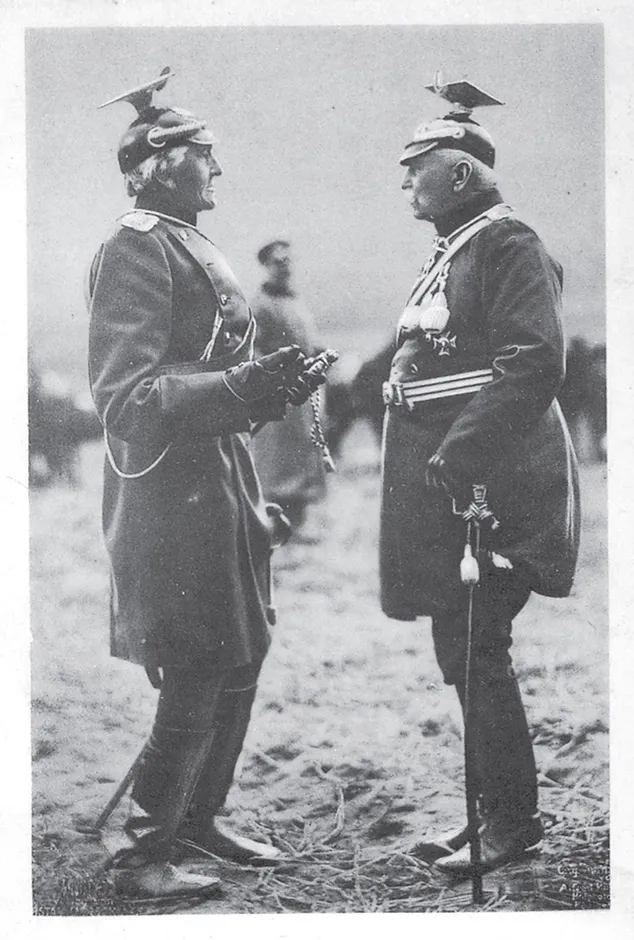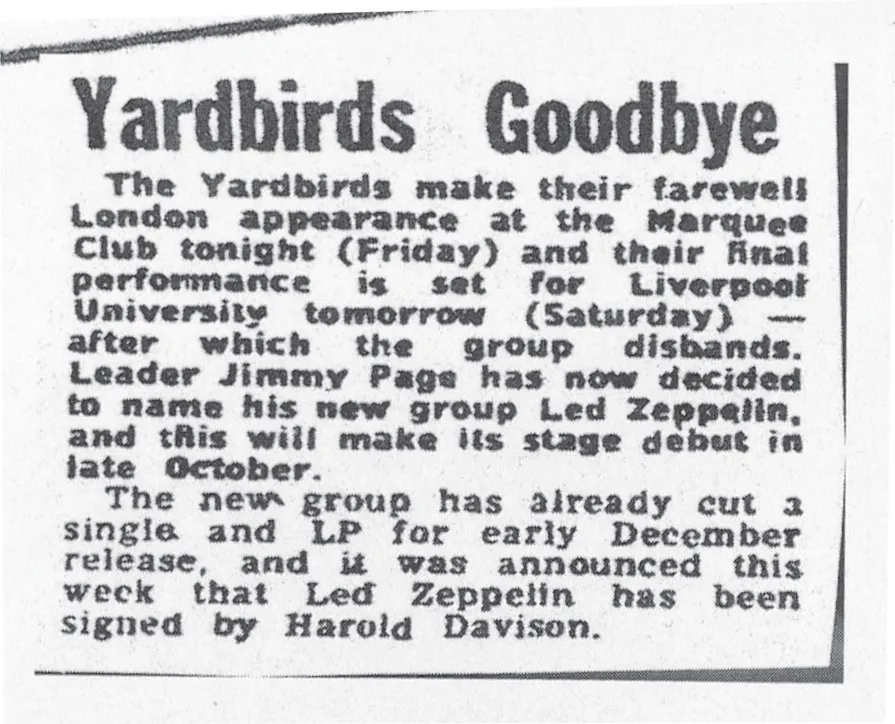1 Lift Off
1968–1969
Led Zeppelin is, was, and always will be Jimmy Page’s band. Unlike the Stones, the Beatles, and the Who, this British band didn’t bring an outside producer into the recording studio. Page was the producer—and the chief songwriter, the architect, the mixing supervisor, the leader. But his group didn’t start as Led Zeppelin.
In May 1966, Page joined his pal Jeff Beck in the Yardbirds. Despite “For Your Love” and other Yardbirds hits, the newcomer didn’t realize the shape of things to come. The vaunted Page/Beck double-guitar attack was short-lived because, in October 1966, Beck bowed out two shows into a U.S. tour with Dick Clark’s Caravan of Stars, leaving Page as the main man. When he went into the studio the following year to make what would be his only Yardbirds album (Little Games), the guitarist butted heads with singles-oriented producer Mickie Most, who was riding high with hits by Lulu, Herman’s Hermits, and Donovan. Meanwhile, the Yardbirds’ aggressive new manager, Peter Grant, kept the band on the road—Japan, France, and especially the United States. That proved too much touring for singer Keith Relf and drummer Jim McCarty, who quit in the summer of ’68. Page, feeling obligated to honor commitments for an autumn swing through Scandinavia, began looking for replacements.
Terry Reid, eighteen, was his first choice. “He was the only vocalist I knew, but he’d just signed up with Mickie Most so he was out of the question,” Page told CREEM magazine in 1974. “[Reid] did suggest Robert Plant—said he lived in Birmingham and that we should try and track him down. So we went to see him at a college gig, and I had a chat with him and said I was trying to get something together and would he be interested to come down and have a chat? He came down and stayed for a couple of nights, and it just went on from there.”
Led Zeppelin on tour, U.S. East Coast, spring 1969. Charles Bonnay/Time & Life Pictures/Getty Images
Yardbirds, Santa Monica Civic Auditorium, Santa Monica, CA, July 22, 1967.
Yardbirds, Little Games, released July 24, 1967.
Yardbirds, Kerrisdale Arena, Vancouver, BC, July 31, 1967. Artist: Bob Masse.
Those couple of nights included bonding over Page’s record collection—from Howlin’ Wolf and Buddy Guy to Elvis Presley and Iron Butterfly. The object of their mutual affection was, oddly enough, American folk singer Joan Baez’s interpretation of the traditional “Babe I’m Going to Leave You.”
John Bonham, a loud and manic drummer, was an old buddy of Plant’s, having played with the singer in the Band of Joy. After lots of arm-twisting, he was recruited away from Tim Rose’s band. Page decided to replace bassist Chris Dreja, an original Yardbird, with multi-instrumentalist John Paul Jones, who had contacted Page after reading an article about a new band in Disc magazine. (Jones had led the cello section for the Yardbirds’ tune “Little Games” a year earlier.) The guitarist gathered the quartet for a test drive in a tiny room below a London record store. They broke the ice with “The Train Kept A-Rollin,” and the New Yardbirds, as an August 5, 1968, press release declared, were born.
“I think what it is, is that the four members of Led Zeppelin were so different as personalities in their everyday lives and what made them tick, we were just totally different, but somehow we were brought by divine providence together to play,” Page told Detroit writer Gary Graff in 2003. “Even in the first rehearsal we did. We rehearsed one number in this rehearsal room. There was this sort of stunned silence, anticipation. It was like heaven knows what it was. None of us had actually played with our musical equals; all of a sudden there was the four of us joined together, and it was just really eerie. It was so good that it was eerie. And that aspect of it was with us from that first day to the last.”
“We all did it for different reasons,” Jones told the San Diego Union Tribune in 2003. “I wanted to get out of studio work. We had to persuade Bonzo to leave Tim Rose because he had doubts about us. Bonzo wasn’t sure we could pay him more than 40 pounds [about $120 U.S.] a week so we really had to work on him. Robert saw it as a natural progression. Jimmy had the idea to start a band while he was in the Yardbirds. As soon as we started playing together, we said: ‘This is good, so who cares how long it lasts?’ We didn’t plan any further. We didn’t plan for world domination.”
“I’d have to say my main blues influence was Howlin’ Wolf, and his stuff wasn’t just straight groove, playing on the beat, either. I loved his voice and the sheer intensity of the music as well as the timing of it. I’ve often thought that in the way the Stones tried to be the sons of Chuck Berry, we tried to be the sons of Howlin’ Wolf.”
—Jimmy Page on the band’s first rehearsal, quoted in Cameron Crowe’s “Led Zeppelin: Light And Shade”
Blues legend Howlin’ Wolf, a Zep influence over whom Page and Plant bonded early on. Chess Records
The heaviest band of all time’s namesake (right).
Newspaper clipping announcing the Yardbirds’ last gigs and the debut of Led Zeppelin, autumn 1968.
Band of Joy, Middle Earth Club, London, January 26, 1968.
“They may be world-famous, but a couple of shrieking monkeys are not going to use a privileged family name without permission.”
—Countess Eva von Zeppelin
First U.S. tour, Whiskey a Go Go, Los Angeles, January 2 and 4–5, 1969.
Yardbirds, Middle Earth Club, London, January 19, 1968.
“The room was about 18x30, very small. We just played one number ‘Train Kept A-Rollin,’ and it was there immediately. An indescribable feeling.”
—Jimmy Page on the band’s first rehearsal, quoted in Cameron Crowe’s “Led Zeppelin: Light And Shade”
Early U.K. club gig, Roundhouse, London, November 9, 1968.
The New Yardbirds, Marquee Club, London, October 18, 1968. The concert was the first in the U.K. by the lineup that was to become Led Zeppelin. Graham Wiltshire/Hulton Archive/Getty Images
The two weeks of New Yardbirds gigs in Denmark, Norway, and Sweden turned out to be the rehearsals for the debut album, Led Zeppelin. “It came together really quick,” Page told CREEM in 1974 of the first LP. “It was cut very shortly after the band was formed. For material, we obviously went right down to our blues roots. I still had plenty of Yardbirds riffs left over. By the time Jeff [Beck] did go, it was up to me to come up with a lot of new stuff. It was this thing where [Eric] Clapton set a heavy precedent in the Yardbirds, which Beck had to follow and then it was even harder for me, in a way, because the second lead guitarist had suddenly become the first. And I was under pressure to come up with my own riffs. On the first LP, I was still heavily influenced by the earlier days. I think it tells a bit, too. The album was made in three weeks.”
Knowing his way around the music business, Page took an uncommon approach with his new project: “I wanted artistic control in a vise grip, because I knew exactly what I wanted to do with these fellows,” he told Guitar World. “In fact, I financed and completely recorded the first album before going to Atlantic [Records]. It wasn’t your typical story where you get an advance to make an album—we arrived at Atlantic with tapes in hand. The other advantage to having such a clear vision of what I wante...

